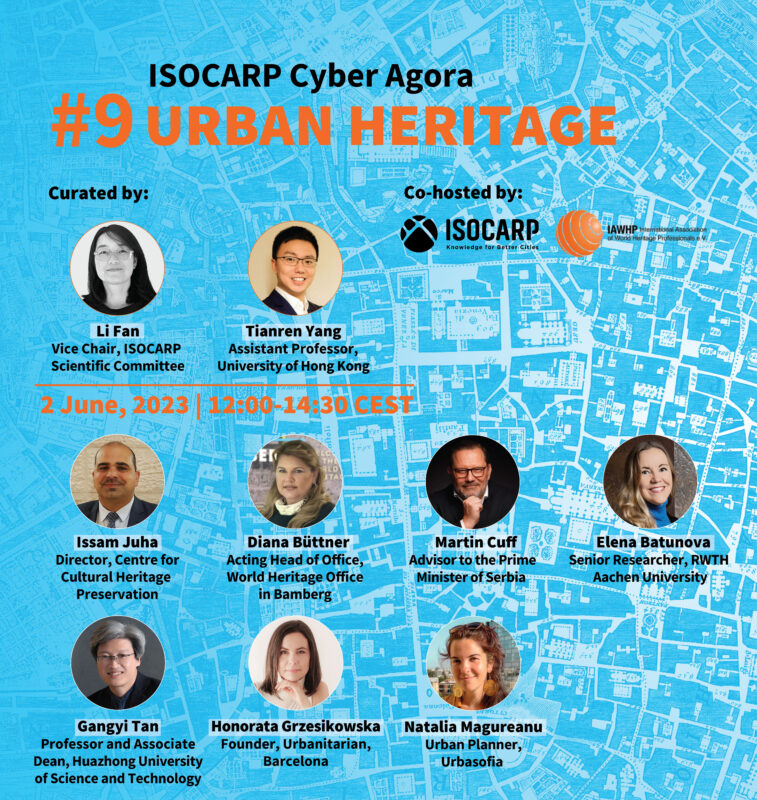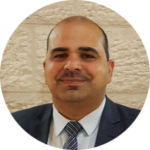The International Society of City and Regional Planners (ISOCARP) and the International Association of World Heritage Professionals (IAWHP) are excited to invite you to this joint webinar, which will take place on Friday June 2, from 12:00 to 14:30 CEST.
Join us in this dialogue between practitioners, academics, and professionals worldwide.
We are looking forward to learning and reflecting on international best practices and research regarding the protection and management of Urban Heritage!

Background and Aim
Cultural heritage has potential impacts on economic development and the people’s quality of life. During the last decades, the role of cultural heritage has been increasingly acknowledged as a strategic source for economic growth, employment and social wellbeing. This refers particularly to urban heritage, especially regarding quality of life.
Different from single monuments or sites, the living heritage of urban neighborhoods, towns and cities is facing challenges not only related to its physical structures and their progressive decay over time, but also to the quality of life of large numbers of people who live inside the historic cores. The communities are part of the heritage as well as the creators and protectors of local culture including the built settlement and intangible heritage such as traditional handicrafts. They comprise the different generations of residents, business people who run the traditional shops that contribute to the vitality of the place as well as associations of civil society which are involved in the daily practices of heritage management. Therefore, in terms of urban heritage, one of the largest challenges is to integrate the local communities in the process of heritage protection and management. The restrictions imposed by heritage management may be a costly burden and a challenge to modern lifestyles. To help the communities achieve better living and working conditions in the protected environment is one of the major tasks of heritage management in an attempt to sustainably conserve the site.
Given its high universal value, urban heritage is shaped and shared by broad communities across institutions and territories. However, the conservation of heritage has remained in the hands of few groups and they do not always communicate with each other. Thus, the joint webinar aims to stimulate dialogues between practitioners, academics and professionals. International best practices and research on protecting and managing urban heritage will be introduced, discussed, compared and reflected upon.
Content
Three sessions are organised with regard to the sustainable conservation of urban heritage.
Session 1 is dedicated to voices of practitioners who work at the front line of heritage protection, dealing with complex daily social and political challenges.
In Session 2 academics draw attention to the understated heritage. The cultural and social significance of urban heritage shaped local identity and built a collective memory.
In Session 3 urban planning professionals take a broad view on heritage protection and endeavor to explore innovative strategies towards sustainable urban heritage conservation.
The following questions will be explored:
- In the practice of heritage conservation and management, how do local communities get involved and get to be part of the decision-making process?
- If the past is another world, how do we acknowledge the value of heritage through rediscovering it?
- How to integrate heritage management into the governance structure?
Curators

Li Fan
Vice Chair, ISOCARP Scientific Committee

Tianren Yang
Assistant Professor, University of Hong Kong
Speakers

Issam Juha
Director, Centre for Cultural Heritage Preservation (Palestine)

Diana Büttner
Acting Head of Office, World Heritage Office, City of Bamberg (Germany)

Martin Cuff
Advisor to the Prime Minister for Creative Industries and Tourism, Government of the Republic of Serbia

Elena Batunova
Senior Researcher, RWTH Aachen University (Germany)

Tan Gangyi
Professor and Associate Dean, Huazhong University of Science and Technology (China)

Honorata Grzesikowska
Founder, Urbanitarian, Barcelona (Spain)

Natalia Magureanu
Urban Planner, Urbasofia (Romania)
With the participation of

Pietro Elisei
President of ISOCARP

Patricia Alberth
President of IAWHP

Shi Nan
Secretary General, Urban Planning Society of China

Zeynep Enlil
Chair GPEAN/ISOCARP Scientific Committee Member

Rolf Schuett
Board Member, IAWHP

Johanna Blokker
Chair of Architectural Conservation, BTU Cottbus

Sabina Dimitriu
Board Member, ISOCARP